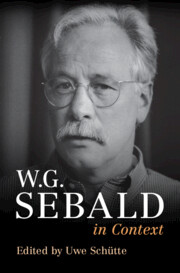Book contents
- W.G. Sebald in Context
- W.G. Sebald in Context
- Copyright page
- Dedication
- Contents
- Illustrations
- Notes on Contributors
- Preface
- Acknowledgements
- Note on Text
- Chronology
- Abbreviations
- Works by W.G. Sebald
- Part I Biographical Aspects
- Part II The Literary Works
- Part III Themes and Influences
- Chapter 17 Critical Writings
- Chapter 18 Minor Writing
- Chapter 19 Franz Kafka
- Chapter 20 Literary Predecessors
- Chapter 21 Walter Benjamin
- Chapter 22 Philosophical Models
- Chapter 23 History
- Chapter 24 Polemics
- Chapter 25 Holocaust
- Chapter 26 Photography
- Chapter 27 Paintings and Ekphrasis
- Chapter 28 Media Theory
- Chapter 29 Travel Writing
- Chapter 30 Ecocriticism and Animal Studies
- Part IV Reception and Legacy
- Further Reading
- Index
Chapter 24 - Polemics
from Part III - Themes and Influences
Published online by Cambridge University Press: 24 August 2023
- W.G. Sebald in Context
- W.G. Sebald in Context
- Copyright page
- Dedication
- Contents
- Illustrations
- Notes on Contributors
- Preface
- Acknowledgements
- Note on Text
- Chronology
- Abbreviations
- Works by W.G. Sebald
- Part I Biographical Aspects
- Part II The Literary Works
- Part III Themes and Influences
- Chapter 17 Critical Writings
- Chapter 18 Minor Writing
- Chapter 19 Franz Kafka
- Chapter 20 Literary Predecessors
- Chapter 21 Walter Benjamin
- Chapter 22 Philosophical Models
- Chapter 23 History
- Chapter 24 Polemics
- Chapter 25 Holocaust
- Chapter 26 Photography
- Chapter 27 Paintings and Ekphrasis
- Chapter 28 Media Theory
- Chapter 29 Travel Writing
- Chapter 30 Ecocriticism and Animal Studies
- Part IV Reception and Legacy
- Further Reading
- Index
Summary
This essay aims to shed light on Sebald the polemicist and provocateur, draw attention to a central component of his literary criticism that is often ignored from an anglophone perspective. The essay first deals with the two academic monographs in which Sebald violently attacks the German-Jewish writers Alfred Döblin and Carl Sternheim, disparaging them as trailblazers for the Nazis. The consistently negative academic reviews Sebald writes from 1970 onwards as a junior academic are discussed as his personal way of participating in the political upheavals of the 1960s. After the rather quiet decade of the 1980s, Sebald’s polemical impetus flares up again, parallel to his emergence as a literary author. Jurek Becker, another German-Jewish author (and Holocaust survivor) once more serves as target of his polemics. What emerges from an examination of his polemical writings are two major findings: first, Sebald tried to learn lessons from the writers he attacked, avoiding what he saw as their flaws in his own writing. Second, Sebald’s lifelong urge to polemicize was closely tied to the issue of upward social mobility, the aggression arising from feeling to be a perpetual outsider in the social environment of academia.
Keywords
- Type
- Chapter
- Information
- W. G. Sebald in Context , pp. 210 - 221Publisher: Cambridge University PressPrint publication year: 2023
- 1
- Cited by

